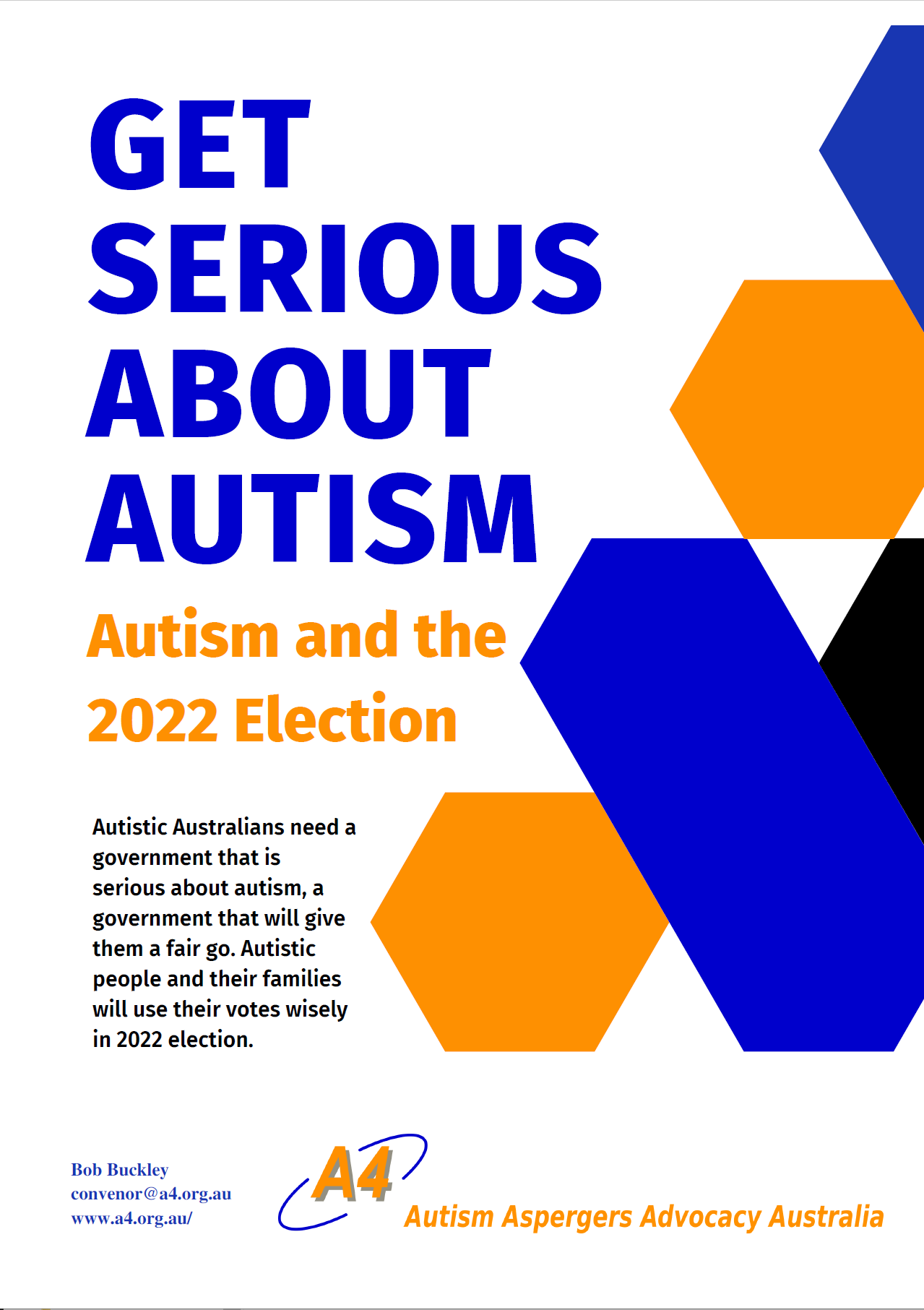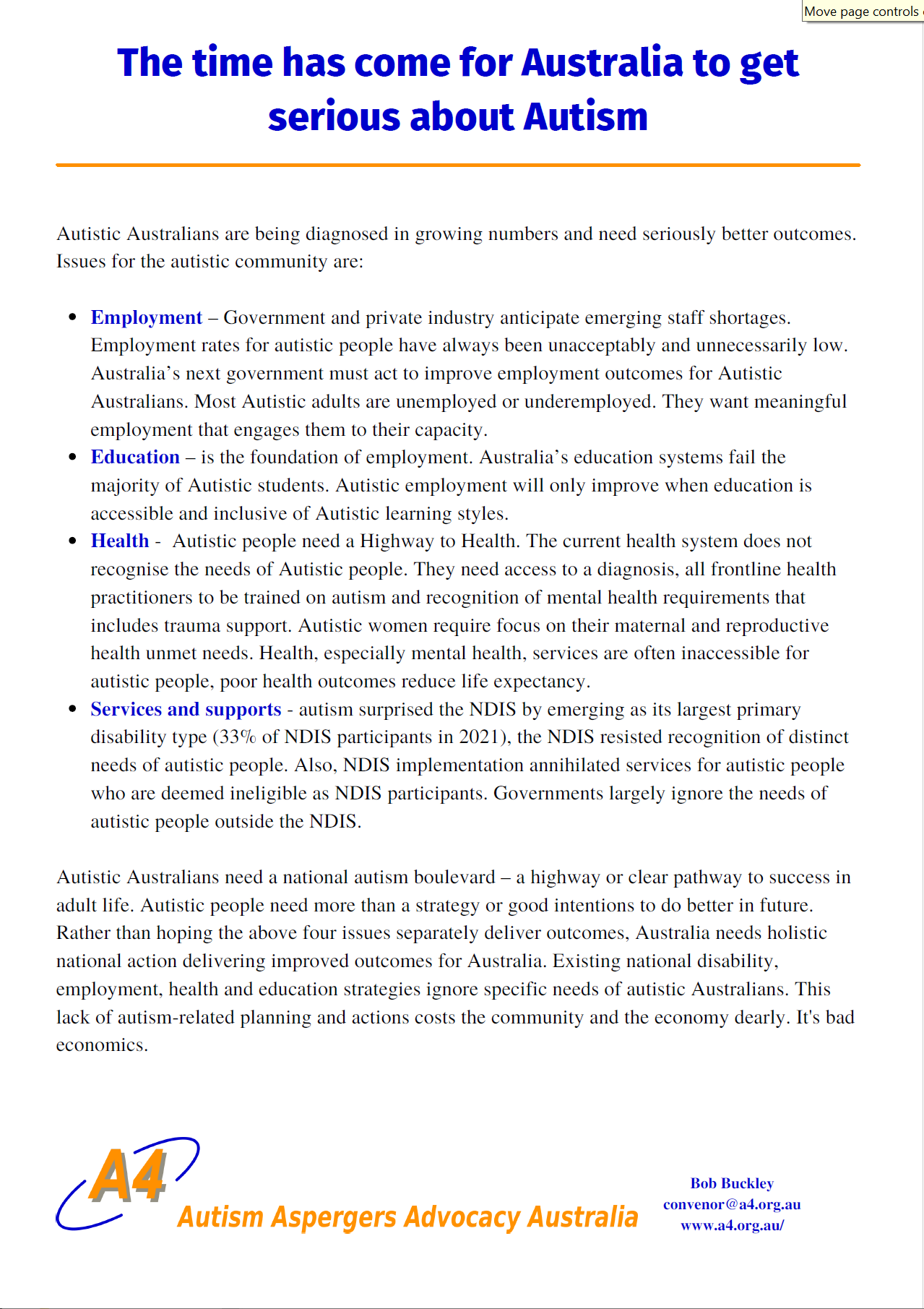2022 Federal Election - Get Serious about Autism
2022 Federal Election - Get Serious about Autism

Autistic Australians need a government that is serious about autism, a government that will give them a fair go. Autistic people and their families will use their votes wisely in 2022 election.
The time has come for Australia to get serious about Autism
Autistic Australians are being diagnosed in growing numbers and need seriously better outcomes. Issues for the autistic community are:
Employment – Government and private industry anticipate emerging staff shortages.Employment rates for autistic people have always been unacceptably and unnecessarily low.Australia’s next government must act to improve employment outcomes for Autistic Australians. Most Autistic adults are unemployed or underemployed. They want meaningful employment that engages them to their capacity.
Education – is the foundation of employment. Australia’s education systems fail the majority of Autistic students. Autistic employment will only improve when education is accessible and inclusive of Autistic learning styles.
Health - Autistic people need a Highway to Health. The current health system does not recognise the needs of Autistic people. They need access to a diagnosis, all frontline health practitioners to be trained on autism and recognition of mental health requirements that includes trauma support. Autistic women require focus on their maternal and reproductive health unmet needs. Health, especially mental health, services are often inaccessible for autistic people, poor health outcomes reduce life expectancy.
Services and supports - autism surprised the NDIS by emerging as its largest primary disability type (33% of NDIS participants in 2021), the NDIS resisted recognition of distinct needs of autistic people. Also, NDIS implementation annihilated services for autistic people who are deemed ineligible as NDIS participants. Governments largely ignore the needs of autistic people outside the NDIS.
Autistic Australians need a national autism boulevard – a highway or clear pathway to success in adult life. Autistic people need more than a strategy or good intentions to do better in future.Rather than hoping the above four issues separately deliver outcomes, Australia needs holistic national action delivering improved outcomes for Australia. Existing national disability,employment, health and education strategies ignore specific needs of autistic Australians. This lack of autism-related planning and actions costs the community and the economy dearly. It's bad economics.
| Attachment | Size |
|---|---|
| 2022FederalElection-01.pdf (127.2 KB) | 127.2 KB |
needing a National Autism Strategy
needing a National Autism StrategyA4 identified employment, education, health and disability services as areas of government that need to substantial reform to deliver equitable outcomes and basic human rights for autistic Australians.
Ideally, all these areas of government would work cooperatively and with the autistic and wider autism-related sectors of our community to achieve improved outcomes. We need a National Autism Strategy encompassing all these areas.
Recently, the Senate Select Committee on Autism published its report (view online here). The report contains 86 recommendations (81 in the main report and 5 in the Green's dissenting report). Recommendation 1 of the reports says:
5.62 The committee recommends that the Australian Government develop a National Autism Strategy and accompanying implementation within
12 months to drive nationally-coordinated action to improve services and supports for autistic Australians. The National Autism Strategy should:
- be both person- and family-centred;
- address whole-of-life needs for people across the breadth of the spectrum;
- align with other national strategies, including the National Disability Strategy; and
- be informed by the recommendations of this inquiry and the Disability Royal Commission.
Many of the other recommendations add detail to the contents of a Nation al Autism Strategy.
In the 2022 election campaign, the two major parties announced plans for a National Autism Strategy. Following are links to their announcements:
- Liberals: see https://twitter.com/hollieahughes/status/1522787607738224641
- Labor: see https://www.amaze.org.au/2022/04/amaze-welcomes-labors-disability-plan-and-commitment-to-a-national-autism-strategy/
The ABC article on these announcements is available at https://a4.org.au/node/2439
Employment for autistic Australians
Employment for autistic AustraliansEmployment is a key issue for autistic people. The series of reports from the Australian Bureau of Statistics (ABS) reports on Disability, Ageing and Carers (SDAC) show a massive and ongoing problem with employment outcomes for autistic Australians.
The ABS reported from its 2018 data that:
The labour force participation rate was 40.8% among the 75,200 people of working age (15-64 years), living with autism spectrum disorders. This is compared with 53.4% of working age people with disability and 83.2% of people without disability.
The unemployment rate for people with autism spectrum disorders was 31.6%, more than three times the rate for people with disability (10.0%) and almost six times the rate of people without disability (5.3%).
While reports suggest labour force participation rates improving, this is due largely to harsher and increasingly unreasonable DSP eligibility measures. A decade ago, the same reports indicated:
In 2009, the labour force participation rate for people with autism was 34%. This compares with 54% labour force participation rate for people with disabilities and 83% for people without disabilities.
Tragically, governments ignore these data; they refuse to recognise and do nothing to address the challenge of employment for autistic Australians. The previous National Disability Strategy 2010-20 essentially ignored autism and the well-documented employment problems autistic people endure. The government’s disability employment effort targets people with disability generally, a strategy that ensures autistic people are left behind.
The new Australian Disability Strategy 2021-31 is a plan for another decade of doing nothing to improve employment outcomes for increasing numbers of autistic Australians. We anticipate that the National Disability Employment Strategy that is now in development[1] will also ignore the particular needs of unemployed autistic Australians. Autistic representation and advice on employment is unheeded.
Keep points are:
- Most autistic people want to work. They prefer and usually depend on the routine of regular employment.
- Most autistic people are capable workers – in the right jobs, they perform exceptionally well. This is starting to be recognised for some autistic people in parts of the IT sector. There are many other roles where autistic people can perform far better than others if they are given an opportunity and a bit of support.
- The Australian Disability Strategy 2021-31 and the National Disability Employment Strategy (under development) do not recognise especially poor employment outcomes for autistic Australians – Australia needs a National Autism Strategy to improve outcomes for autistic people in Australia
- Education does not prepare autistic people for employment – in many cases it does not prepare them for life after they leave school
- Employers are currently complaining about staff shortages – has disability employment improved? Reports suggest we should soon see Australia’s unemployment with a 3 at the front. What will it be for autistic Australians?
Policy goals
- Educate and incentivise employers to employ autistic people
- Improve education to help autistic students prepare for autistic students for adult life
- Action that improves autistic employment
[1] by DSS, rather than DEEWR.
Educating autistic students
Educating autistic studentsEducation is the foundation for employment. The abysmal employment outcomes for autistic Australians result from ineffective education.
The ABS reports:
In 2009, 12% of children with autism attended school and did not experience any educational restrictions. Of the remaining 88% who did experience some restrictions, 3% of children were not able to attend school because of their disability and 47% needed to attend either a special class in a mainstream school, or a special school.
and
In 2018, 92.3% of young people (101,900) aged 5 to 20 years on the autism spectrum attending school had some form of educational restriction (92.3%), including a small number who were unable to attend school because of their disability. Two in five (40.8%) of the children attended a special class in a mainstream school or a special school.
Of the 106,600 young people (aged 5 to 20 years) with autism who were attending school or another educational institution, 77.7% reported experiencing difficulty at their place of learning. Of those experiencing difficulties, the main problems encountered were fitting in socially (59.8%), learning difficulties (55.3%) and communication difficulties (51.5%).
…
People with autism are less likely than others to complete an educational qualification beyond school and have needs for support that differ from people with other disabilities. Of those with autism, 8.1% had a bachelor degree or higher, compared with 16.1% of those with a disability and 31.2% of those without disability. All people with disability and those with no disability were also more likely to have an Advanced Diploma, Diploma or Certificate III or IV than people with autism.
Key points are that autistic Australians experience:
- abysmal outcomes in education, both academically and socially
- life-long unemployment of autistic people is the result of their failed education
- autistic students experience high and unacceptable levels of bullying and trauma. Their experience impacts on their mental health long-term, especially stress, anxiety, depression, psychosis, self-esteem and poor health generally
While “public education” is state/territory responsibility, the Commonwealth funds the private education sector (which has low participation and poor outcomes from autistic students). The Commonwealth also has obligations to ensure autistic student can access appropriate and effective education.
Many autistic students are simply excluded from NAPLAN so we don’t measure how bad education is for autistic students. Excluding autistic students means their educational progress and outcomes are not measured and reported. Without measurement and reporting, there is no “reason” to try to improve education outcomes for autistic students.
The biggest change seen in recent time are school systems changing their terminology. We see “special education” service and supports being rebranded as “inclusive”, but nothing else changes. If anything, COVID has enabled increasing segregation and decreased attention to the individual needs of diverse students.
Policy goals
- Improved and more effective education of autistic students (according to measured outcomes) - observable improvement in education measures for autistic people, such as NAPLAN, graduation rates, tertiary education outcomes.
- Increase tertiary education
- Improved employment for autistic school leavers
Autistic Australians and their health
Autistic Australians and their healthA4 is currently developing an information package on improving health outcomes for Autistic Australians. In the meantime, see:
- Brief: Autism and Mental Health
- Brief & meeting with Health officials - autism is a distinct disability
In a recent report, the Disability Royal Commission found severe problems with how Australia's health system responds to people with cognitive disability (which includes autistic people). See https://disability.royalcommission.gov.au/news-and-media/media-releases/greater-training-needed-health-professionals-caring-people-cognitive-disability
Particular problems with mental health generally are discussed here.
A4 has ongoing discussions with Health officials scheduled for after the coming election. We also expect to engage with the incoming Health Minister.
Disability service and support for Autistic Australians - NDIS and beyond
Disability service and support for Autistic Australians - NDIS and beyondThe Australian Government's War on Autism
A4 is developing a brief position paper on improving disability services and supports, including the NDIS, to recognise and address the needs of autistic Australians.
In A4's view, the Commonwealth government, and especially its NDIA, is conducting a war on autistic people. See
- Coalition government’s ongoing war on autistic Australians
- unanswered question about the Government's war on autistic Australians
- Dear PM - the Government's war on autistic Australians
- https://a4.org.au/node/2441
The NDIA especially targets the nations most vulnerable autistic citizens - see https://a4.org.au/node/2567
This war on autism needs to stop.